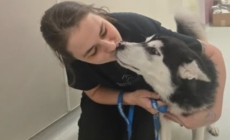-
FedEx Cup: Five Players Who Crumbled at St. Jude Championship - 42 mins ago
-
What the Nvidia Chip Payoff Deal Says About Trump’s Trade War - 50 mins ago
-
Pakistan Makes Nuclear Threat to India From US Soil - about 1 hour ago
-
The Harvard-Trained Lawyer Behind Trump’s Fight Against Top Universities - 2 hours ago
-
To tackle homelessness, Los Angeles moves to centralize its response - 2 hours ago
-
Max Verstappen Uncovers Crucial McLaren Secret Behind its F1 Domination - 2 hours ago
-
Miguel Uribe, Colombian Senator Shot at Campaign Event, Dies at 39 - 2 hours ago
-
From rescued to rescuer: Sydney helps Eaton fire evacuees heal - 2 hours ago
-
Huskies Left Behind After Owners Moved Out Now Seek a Forever Home - 2 hours ago
-
UCLA and Newsom go to battle with Trump over grant freezes, $1-billion fine - 3 hours ago
Medical Experts Raise Grave Doubts Over Conviction of ‘Killer Nurse’ Lucy Letby
An international panel of 14 neonatal and pediatric specialists on Tuesday raised grave doubts about the evidence used to convict the British nurse Lucy Letby, who was found guilty in 2023 of murdering seven babies at the hospital where she worked.
In a dramatic news conference in London, the chair of the panel, Dr. Shoo Lee, a Canadian neonatologist, said that the extensive independent review he chaired had found no evidence that Ms. Letby had murdered or attempted to murder any of the babies in her care.
He also highlighted damning findings pointing to serious errors in medical care at the unit where the deaths occurred and to chronic failings in the management of neonatal conditions. He said that some of the deaths had been preventable.
“Our conclusion was there was no medical evidence to support malfeasance causing injury in any of the 17 cases in the trial,” Dr. Lee said. “In summary, ladies and gentlemen, we did not find any murders.”
The review is significant because it was carried out by some of the most prestigious and respected neonatal and pediatric specialists in the world.
The experts were allowed to assess all of the available medical records related to the babies, and they delivered their assessment pro bono. The panel underlined the serious pre-existing conditions of some of the babies, and in several cases, the specialists found significant errors in the treatment or care of the infants.
Ms. Letby, 35, was sentenced to a whole life order in 2023 — meaning that she would spend the rest of her life in prison — after being convicted of killing seven babies and attempting to murder seven others at the neonatal unit of the Countess of Chester Hospital in northwestern England in 2015 and 2016. She has always maintained her innocence.
The case horrified Britain, but since her convictions, dozens of experts in neonatology and statistics have raised questions about the evidence and argued that there might have been a miscarriage of justice.
Dr. Lee led the independent review of the babies’ cases, which involved a panel of specialists from countries including Britain, Canada, Germany, Japan, Sweden and the United States.
He emphasized the independence of the panel, noting that when the experts embarked on their investigation, they were clear that the report would be released whether the findings were favorable or unfavorable for Ms. Letby.
They simply focused on coming up with an “impartial cause of death based on evidence,” he said.
The review found that all the babies had died or been harmed either because of natural causes or because of errors in medical care.
Dr. Lee had coauthored an academic paper published in 1989 that looked into air embolisms in the bloodstreams of babies and noted that some showed signs of skin discoloration. That research was heavily relied on by Dr. Dewi Evans, the prosecution’s lead expert witness in the Letby case. Dr. Evans argued in court that some of the babies who died or deteriorated had exhibited similar patterns on their skin.
After the trial, Dr. Lee discovered that his research had been used to convict Ms. Letby. He agreed to give evidence in Ms. Letby’s appeal, telling a hearing that Dr. Evans had misinterpreted his findings and that none of the babies in the trial should have been diagnosed with air embolism. Ultimately, the appeal court decided that his evidence would not be heard, arguing that Ms. Letby’s defense team should have called Dr. Lee in the original trial.
The panel examined the case of each baby, and, during the briefing, highlighted a few of the cases and the panel’s detailed findings.
In the case of “Baby 1,” who prosecutors alleged was killed by Ms. Letby by injecting air into the infant’s veins, the panel determined the cause of death to be thrombosis from an existing issue.
Another child, identified by the panel as “Baby 9,” who the prosecution had argued had also died after Ms. Letby injected air, was found by the experts to have “died of respiratory complications” caused by chronic lung disease, among other issues. The panel also found that the baby’s death was likely preventable and described a number of errors in treatment.
In the case of “Baby 11,” the prosecution had argued that Ms. Letby had deliberately dislodged a breathing tube. But the experts said that there was no evidence to support the claim that the tube had been dislodged. They argued instead that an initial attempt by a consultant doctor to resuscitate the baby had been “traumatic and poorly supervised,” that the wrong equipment had been used and that the doctor “didn’t understand the basics” of how the equipment for mechanical ventilation worked.
“It was just that the consultant didn’t know what he was doing,” Dr. Lee said in summarizing the case.
Dr. Neena Modi, a member of the panel and a neonatology professor at Imperial College London, said there were “very plausible reasons for these babies’ deaths.”
“There was a combination of babies being delivered in the wrong place, delayed diagnosis and inappropriate or absent treatment,” she said. “There are clearly systemic factors at play that we have identified as well as individual factors that we have identified.”
Ms. Letby lost two separate attempts last year to appeal her convictions.
In December, Ms. Letby’s lawyer, Mark McDonald, said that he would ask the Court of Appeal to review all of her convictions because Dr. Evans, the prosecution witness, had changed his mind about how three of the babies had died.
Dr. Evans has repeatedly stood by his evidence, and he told The Times of London this past weekend that he was “very concerned people are getting their facts wrong.”
The babies’ cause of death has been called into question by experts before. In December, the defense team introduced evidence from two neonatologists, Dr. Neil Aiton and Dr. Svilena Dmitrova, who specialize in the care of premature babies. Those experts concluded that two babies whom Ms. Letby had been convicted of killing had not been well and had died for “identifiable medical reasons.”
The doctors, who consulted the medical records of the babies, found that one, identified as Baby C, died after problems with the placenta at the end of pregnancy. They concluded that another, Baby O, died as a result of issues related to resuscitation.
Mr. McDonald, the lawyer, said on Tuesday that he had applied to the Criminal Cases Review Commission, which is responsible for investigating claims of miscarriages of justice. He also noted that he had shared the evidence with Ms. Letby, and, while he declined to share further details of her state of mind, he said, “She has hope, and that’s all I can say.”
The Criminal Cases Review Commission confirmed that it had received a request to look at the case, but it was unclear how long that would take.
“We are aware that there has been a great deal of speculation and commentary surrounding Lucy Letby’s case, much of it from parties with only a partial view of the evidence,” a spokesperson for the review body said, adding that the families affected by the events should be kept in mind.
It is not for the commission to “determine innocence or guilt in a case,” the spokesperson noted, “that’s a matter for the courts.”




















